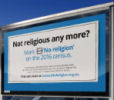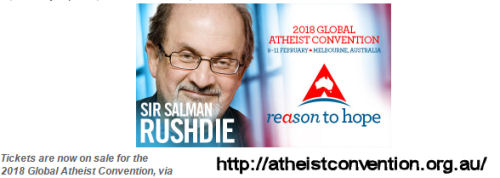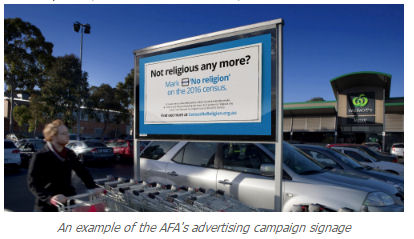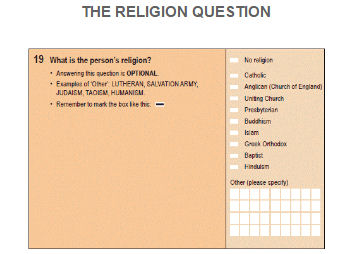Non-believers demand political recognition as Australia's largest single 'religious' group
 The godless in Australia say enough is enough. After today’s release of Census data showing that non-believers make up 30.1% of the population – easily overtaking the previously-highest response “Catholic” for the first time in Census history – the Atheist Foundation of Australia says it is time to stop pandering to religious minorities and take religion out of politics. [Ed. This article also notifies of a 2018 Atheist convention in Australia featuring Salmon Rushdie.]
The godless in Australia say enough is enough. After today’s release of Census data showing that non-believers make up 30.1% of the population – easily overtaking the previously-highest response “Catholic” for the first time in Census history – the Atheist Foundation of Australia says it is time to stop pandering to religious minorities and take religion out of politics. [Ed. This article also notifies of a 2018 Atheist convention in Australia featuring Salmon Rushdie.]
Kylie Sturgess, president of the AFA, says:
“The godless in Australia is a huge force to be reckoned with. Whether you’re an atheist, agnostic, humanist, rationalist, a free-thinker or even someone who considers themselves spiritual but not religious, you’re part of a powerful voting block that deserves to be heard.
Our political, business and cultural leaders must listen to the non-religious when we demand public policy that’s based on evidence, not religious beliefs. This includes policy on abortion, marriage equality, voluntary euthanasia, religious education in state schools and anything else where religious beliefs hold undue influence.”
The AFA says while certain religions – represented by the Australian Christian Lobby, for example – enjoy close connections with certain politicians, atheist representatives have tried, and failed, on multiple occasions to meet with policy-makers.
Kylie Sturgess says:
“It seems to us that certain religious groups get automatic consideration in the public policy sphere. They enjoy a privileged position that isn’t afforded to other large groups, such as the non-religious. That has to stop. Politicians, business leaders and influencers take heed: this is an important milestone in Australia’s history. Those who marked down ‘No religion’ deserve much more recognition. We will be making our opinions known, and there’s power in numbers.”
The Atheist Foundation of Australia will kick-start this much-needed recognition with Reason to Hope, the largest convention of its kind in the southern hemisphere, to be staged in Melbourne in February next year. Headlining the global atheist convention will be Sir Salman Rushdie, author of The Satanic Verses, with British science comedian Robin Ince, American author Greta Christina and Australians Jane Caro, Tracey Spicer, Rod Quantock, Clementine Ford and Jason Ball also scheduled to appear.
See details at
atheistconvention.org.au
(The site does not have https, so we cannot link directly due to the unreasonable dictation of current browsers that stigmatises any site mentioning a URL that does not have https in front of it; you will need to use a search engine.) Tickets are now on sale for the 2018 Global Atheist Convention.

In the lead up to the 2016 Census, the AFA led a public awareness campaign about changes to the way the religion question was asked. For more background, see below:
The 'Mark no religion' campaign
The AFA’s national public awareness campaign to ‘Mark no religion’ ran for six weeks prior to Census night.
It included signage at more than 500 pharmacies and supermarket carparks, on various websites, on one billboard in Melbourne, and via social media.

The campaign was instigated and paid for by the Atheist Foundation of Australia, with help from crowdfunding and other groups such as the Rationalist Society of Australia, Sydney Atheists and the Humanist Society of Victoria.
It invited Australians to mark ‘No religion’ on their Census form, if that best described their religious state.

The 2016 Census was the first in Australia’s history where the ‘No religion’ option sat at the top of ten possible responses, rather than at the bottom.
The Australian Bureau of Statistics made this change to make the religion question consistent with the way other questions were asked on the form.
Australia’s non-religious population has grown since the first Census in 1911, from 0.4% to today’s 30.1%. Up until now, only ‘Catholic’ had a higher response rate, at 25%.
Global Trends
Globally, the numbers of ‘non-religious’ is increasing. Religiously-unaffiliated people account for 16% of the world’s population. They make up the largest “religious group” in seven countries and territories, and they are the second-largest group in roughly half (48%) of the world’s nations. *
In 2016, Ireland’s number of “non-religious” people increased by a whopping 73%. Scotland’s increased from 40% to 52%. In 2014 the percentage of non-religious people in England and Wales grew from 25% to 48.5%. In 2013, New Zealand’s ‘non-religious’ numbers grew from 35% to 42%.
A survey of more than 35,000 Americans found that the percentage of adults who described themselves as Christians dropped by nearly eight percentage points in seven years, from 78.4% in 2007 to 70.6% in 2014. Over the same period, the percentage of Americans who describe themselves as religiously unaffiliated jumped more than six points, from 16.1% to 22.8%. *

Recent comments